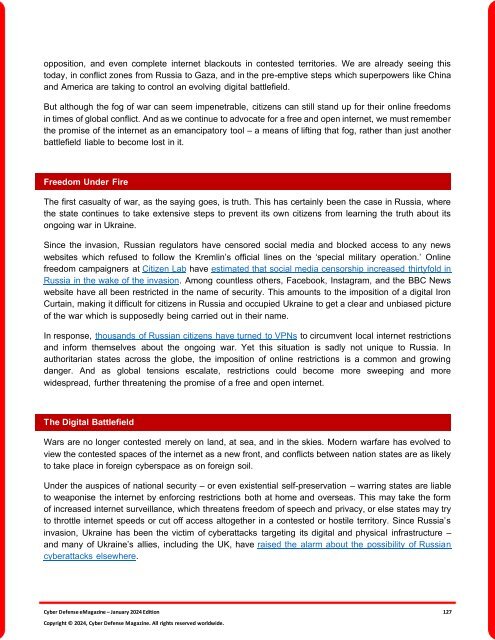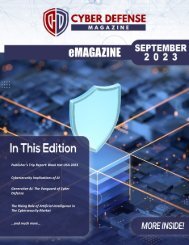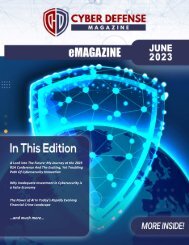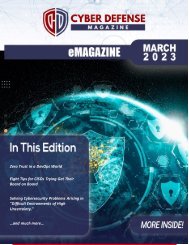The Cyber Defense eMagazine January Edition for 2024
Cyber Defense eMagazine January Edition for 2024 #CDM #CYBERDEFENSEMAG @CyberDefenseMag by @Miliefsky a world-renowned cyber security expert and the Publisher of Cyber Defense Magazine as part of the Cyber Defense Media Group as well as Yan Ross, Editor-in-Chief and many more writers, partners and supporters who make this an awesome publication! 201 page January Edition fully packed with some of our best content. Thank you all and to our readers! OSINT ROCKS! #CDM #CDMG #OSINT #CYBERSECURITY #INFOSEC #BEST #PRACTICES #TIPS #TECHNIQUES
Cyber Defense eMagazine January Edition for 2024 #CDM #CYBERDEFENSEMAG @CyberDefenseMag by @Miliefsky a world-renowned cyber security expert and the Publisher of Cyber Defense Magazine as part of the Cyber Defense Media Group as well as Yan Ross, Editor-in-Chief and many more writers, partners and supporters who make this an awesome publication! 201 page January Edition fully packed with some of our best content. Thank you all and to our readers! OSINT ROCKS! #CDM #CDMG #OSINT #CYBERSECURITY #INFOSEC #BEST #PRACTICES #TIPS #TECHNIQUES
You also want an ePaper? Increase the reach of your titles
YUMPU automatically turns print PDFs into web optimized ePapers that Google loves.
opposition, and even complete internet blackouts in contested territories. We are already seeing this<br />
today, in conflict zones from Russia to Gaza, and in the pre-emptive steps which superpowers like China<br />
and America are taking to control an evolving digital battlefield.<br />
But although the fog of war can seem impenetrable, citizens can still stand up <strong>for</strong> their online freedoms<br />
in times of global conflict. And as we continue to advocate <strong>for</strong> a free and open internet, we must remember<br />
the promise of the internet as an emancipatory tool – a means of lifting that fog, rather than just another<br />
battlefield liable to become lost in it.<br />
Freedom Under Fire<br />
<strong>The</strong> first casualty of war, as the saying goes, is truth. This has certainly been the case in Russia, where<br />
the state continues to take extensive steps to prevent its own citizens from learning the truth about its<br />
ongoing war in Ukraine.<br />
Since the invasion, Russian regulators have censored social media and blocked access to any news<br />
websites which refused to follow the Kremlin’s official lines on the ‘special military operation.’ Online<br />
freedom campaigners at Citizen Lab have estimated that social media censorship increased thirtyfold in<br />
Russia in the wake of the invasion. Among countless others, Facebook, Instagram, and the BBC News<br />
website have all been restricted in the name of security. This amounts to the imposition of a digital Iron<br />
Curtain, making it difficult <strong>for</strong> citizens in Russia and occupied Ukraine to get a clear and unbiased picture<br />
of the war which is supposedly being carried out in their name.<br />
In response, thousands of Russian citizens have turned to VPNs to circumvent local internet restrictions<br />
and in<strong>for</strong>m themselves about the ongoing war. Yet this situation is sadly not unique to Russia. In<br />
authoritarian states across the globe, the imposition of online restrictions is a common and growing<br />
danger. And as global tensions escalate, restrictions could become more sweeping and more<br />
widespread, further threatening the promise of a free and open internet.<br />
<strong>The</strong> Digital Battlefield<br />
Wars are no longer contested merely on land, at sea, and in the skies. Modern warfare has evolved to<br />
view the contested spaces of the internet as a new front, and conflicts between nation states are as likely<br />
to take place in <strong>for</strong>eign cyberspace as on <strong>for</strong>eign soil.<br />
Under the auspices of national security – or even existential self-preservation – warring states are liable<br />
to weaponise the internet by en<strong>for</strong>cing restrictions both at home and overseas. This may take the <strong>for</strong>m<br />
of increased internet surveillance, which threatens freedom of speech and privacy, or else states may try<br />
to throttle internet speeds or cut off access altogether in a contested or hostile territory. Since Russia’s<br />
invasion, Ukraine has been the victim of cyberattacks targeting its digital and physical infrastructure –<br />
and many of Ukraine’s allies, including the UK, have raised the alarm about the possibility of Russian<br />
cyberattacks elsewhere.<br />
<strong>Cyber</strong> <strong>Defense</strong> <strong>eMagazine</strong> – <strong>January</strong> <strong>2024</strong> <strong>Edition</strong> 127<br />
Copyright © <strong>2024</strong>, <strong>Cyber</strong> <strong>Defense</strong> Magazine. All rights reserved worldwide.

















